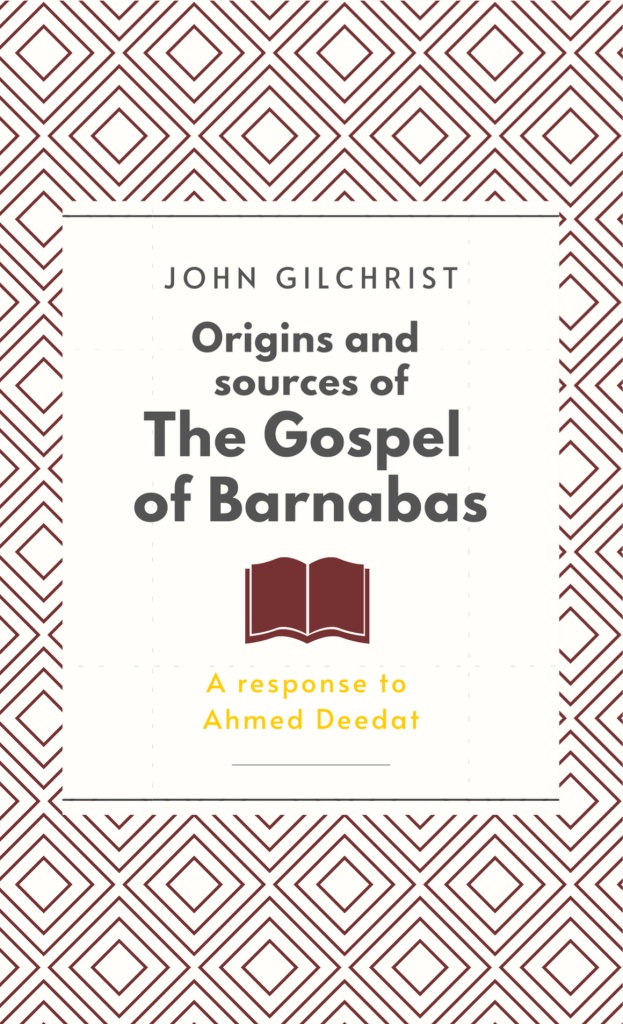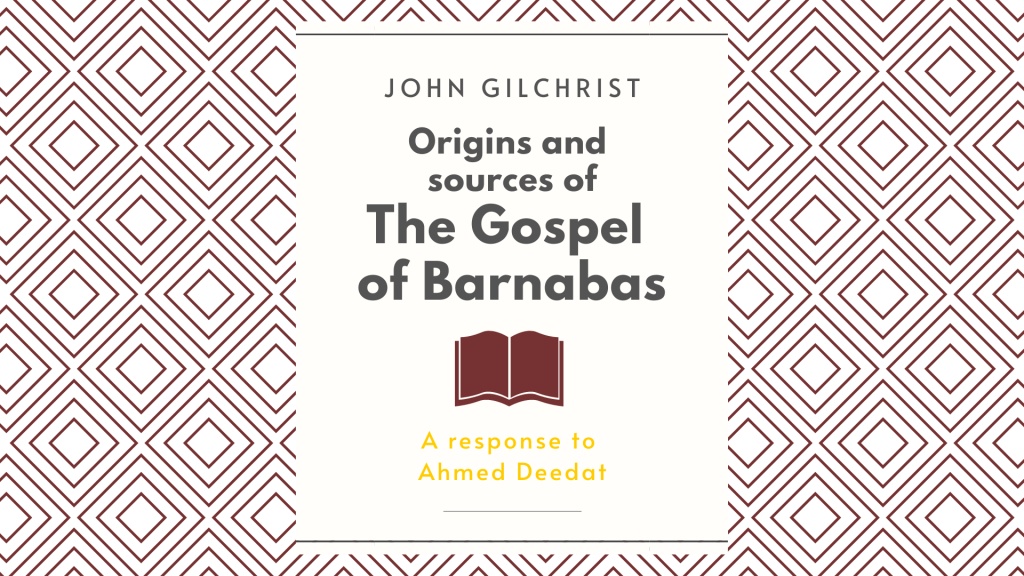Evidence of its Medieval Origin
Origins and Sources of the Gospel of Barnabas


Chapters
« Ch. 2 - Was Barnabas really its author?
We find much evidence in the Gospel of Barnabas that it was first written in the Middle Ages - many centuries after the times of Jesus and Muhammad.
a). The Centenary Jubilee.
In the time of Moses God ordained that the Jews were to observe a jubilee year twice a century:
A jubilee shall that fiftieth year be to you. Leviticus 25:11
Throughout the centuries this command was observed and the Roman Catholic Church eventually took it over into the Christian faith. About 1300 AD Pope Boniface the Eighth gave a decree that the jubilee should be observed once every hundred years. This is the only occasion in all history that the jubilee year was made to be only once every hundred years. After the death of Boniface, however, Pope Clemens the Sixth decreed in 1343 AD that the jubilee year should revert to once every fifty years as it was observed by the Jews after the time of Moses. Now we find in the Gospel of Barnabas that Jesus is alleged to have said:
'And then through all the world will God be worshipped, and mercy received, insomuch that the year of jubilee, which now cometh every hundred years, shall by the Messiah be reduced to every year in every place.' (The Gospel of Barnabas, p.104).
Only one solution can account for this remarkable coincidence. The author of the Gospel of Barnabas could only have quoted Jesus as speaking of the year of jubilee as coming "every hundred years" if he knew of the decree of Pope Boniface. But how could he know of this decree unless he lived at the same time as the Pope or sometime afterwards? This is a clear anachronism which compels us to conclude that the Gospel of Barnabas could not have been written earlier than the fourteenth century AD.
This also means that the Gospel of Barnabas dates at least seven hundred years after the time of Muhammad and it is in the circumstances of no historical value at all. Although it often makes Jesus predict the coming of Muhammad by name (which is why it is a best-seller in the world of Islam today), as it was written after the death of Muhammad, these "prophecies" are of no interest or value at all. Indeed the Gospel of Barnabas contains many discourses and practices fully synonymous with the basic teachings of Islam - but these too are of no value because the book was written at least seven hundred years after the advent of Islam.
Prophecies that are first composed centuries after the event they foretell has come to pass are of no more interest or value than yesterday's weather forecast. We conclude, from the striking quote about the jubilee year, that the author of the Gospel of Barnabas wrote his book not earlier than the fourteenth century after Christ. Let us press on to examine further evidence of mediaeval features.
b). Quotations from Dante.
Dante was an Italian who, significantly, also lived about the time of Pope Boniface and wrote his famous "Divina Comedia" in the fourteenth century. This was basically a fantasy about hell, purgatory and paradise according to the Roman Catholic beliefs of his times.
Now in the Gospel of Barnabas we read that Jesus allegedly said of the prophets of old:
'Readily and with gladness they went to their death, so as not to offend against the law of God given by Moses his servant, and go and serve false and lying gods'. (Gospel of Barnabas, p.27).
The expression "false and lying gods" (dei falsi e lugiardi) is found elsewhere in the Gospel of Barnabas as well. On one occasion it is Jesus again who supposedly uses these words (p.99) and on another it is the author himself who describes Herod as serving "false and lying gods" (p.267). Nevertheless this expression is found in neither the Bible nor the Qur'an. What is interesting, however, is that it is a direct quote from Dante! (Inferno 1.72). Many of the descriptions of hell in the Gospel of Barnabas (pp. 76-77) are reminiscent of those in the third canto of Dante's Inferno as well.
Likewise the expression "raging hunger" (rabbiosa fame) is also reminiscent of the first canto of Dante's Inferno. Both speak of the "circles of hell" and the author of the Gospel of Barnabas also makes Jesus say to Peter:
'Know ye therefore that hell is one, yet hath seven centres one below another. Hence, even as sin is of seven kinds, for as seven gates of hell hath Satan generated it: so there are seven punishments therein'. (The Gospel of Barnabas, p.171).
This is precisely Dante's description found in the fifth and sixth cantos of his Inferno. We could go on and quote many more examples but space here demands that we press on to other evidences that the Gospel of Barnabas was written in the Middle Ages. One striking quote must be mentioned, however, because in this case the Gospel of Barnabas agrees with Dante while contradicting the Qur'an. We read in the Qur'an that there are seven heavens:
He it is who created for you all that is in the earth. Then turned He to the heaven, and fashioned it as seven heavens. Quran 2.29
On the contrary we read in the Gospel of Barnabas that there are nine heavens and that Paradise like Dante's Empyrean - is the tenth heaven above all the other nine. The author of the Gospel of Barnabas makes Jesus say:
'Paradise is so great that no man can measure it. Verily I say unto thee that the heavens are nine ... I say to thee that paradise is greater than all the earth and all the heavens together'. (The Gospel of Barnabas, p.223).
Clearly the author of the Gospel of Barnabas knew Dante's work and had no scruples to quote from it. Accordingly we have further evidence that the Gospel of Barnabas could not have been written earlier than the fourteenth century - hundreds of years after the times of Jesus and Muhammad. It is accordingly a worthless forgery which should be disowned as such by every Muslim who believes in his heart that no lie can be of the truth.
c). The Mediaeval Environment of the Gospel.
The author of the Gospel of Barnabas claims to have been with Jesus throughout his ministry and accordingly must have walked with him throughout the land of Palestine during those three years that Jesus served the people of Israel. In the circumstances we would expect to find a first-century, Palestinian environment in his book - such as we find in the four true Gospels of the Christian Bible. But we are astonished to find many incidents which betray a mediaeval, western-European background in the Gospel of Barnabas. Firstly we read:
'Behold then how beautiful is the world in summer-time, when all things bear fruit. The very peasant, intoxicated with gladness by reason of the harvest that is come, maketh the valleys and mountains resound with his singing, for that he loveth his labours supremely'. (The Gospel of Barnabas, p.217).
This is a fair description of Spain or Italy in summer but most certainly not of Palestine where the rain falls in winter and where the fields are parched in summer. In any event Palestine has always been a part of the world where cultivation of the land has required much effort and where much of the countryside is barren and grassless. We find it surprising that this land should be appealed to as one which in summer-time is a good example of the delightful environment of Paradise. Indeed Jesus is alleged to have delivered this discourse to his disciples in the wilderness beyond the Jordan (p.211) where they were hardly likely to have any evidence of the glories of the lush gardens of Paradise.
Again we read in the Gospel of Barnabas that Martha, her sister Mary, and her brother Lazarus were the overlords of two towns, Magdala and Bethany (p.242). This proprietorship of villages and towns belongs to the Middle Ages when the system of feudalism was rooted in European society. Certainly no such practice was known at the time of Jesus when the occupying Roman forces controlled most of the land of Palestine.
These anachronisms rule out any possibility that the Gospel of Barnabas is genuinely what it claims to be. It does well appear to be a forgery of the Middle Ages written by a Muslim who, probably frustrated at being unable to prove that the true Gospels in the Bible are corrupted, wrote a false Gospel and proclaimed that his corruption was the truth! A similar example of the mediaeval environment of this Gospel is the reference in it to wine casks (p.196), for wine was stored in skins in Palestine (Matthew 9:17) while wooden casks were used in Europe in the Middle Ages.
In conclusion, however, it must be pointed out that whereas the author of the Gospel of Barnabas reveals in his book that he has an accurate knowledge of the structure of mediaeval society, he simultaneously exposes his ignorance of the land of Palestine which he is supposed to have traversed as a disciple of Jesus for at least three years! He says:
Having arrived at the city of Nazareth the sea-men spread through the city all that Jesus had wrought. (The Gospel of Barnabas, p.23).
In this passage Nazareth is represented as a coastal city, a harbour on the lake of Galilee. After this we read that Jesus "went up to Capernaum" (p.23) from Nazareth, as though Capernaum was in the hillside near the sea of Galilee. Here the author really has his facts incorrect, for Capernaum was the coastal city and Nazareth was up in the hills (where it is to this day). Jesus would have gone up from Capernaum to Nazareth, not the other way around as the author of the Gospel of Barnabas has it. This evidence also shows that the author of the Gospel of Barnabas lived in Europe in the Middle Ages rather than in Palestine at the time of Jesus.